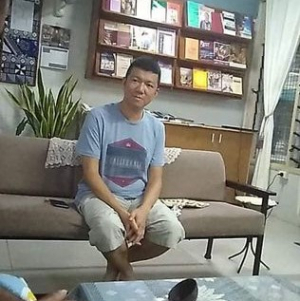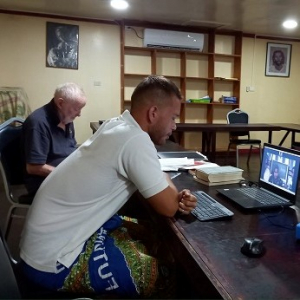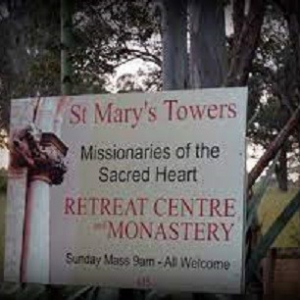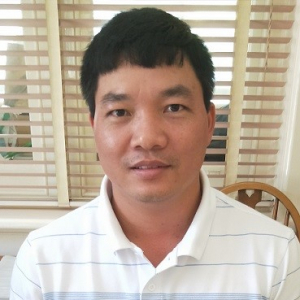Peter MALONE
Je Suis Karl
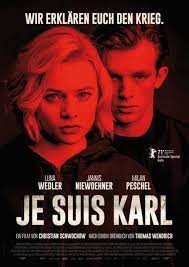
JE SUIS KARL
Germany, 2021, 126 minutes, Colour.
Luna Wedler, Jannis Niewohner, Milan Peschel, Edim Hasanovic, Anna Fialova, Fleyr Geffrier, Aziz Dyab.
Directed by Christian Schwochow.
This is a drama concerned with right-wing movements in continental Europe, especially among the younger generation. By the mid-2010s, there were vast numbers of refugees coming from Syria, Afghanistan as well as from Africa. Angela Merkel welcomed them to Germany but there was great opposition.
This film opens with an act of terrorism, a box with an explosive carried into an apartment block and exploding, killing members of the family, destroying the building. We have been introduced to the mother and father of the family, cheerful on holidays smuggling in a refugee to Berlin. Then there is the introduction to their daughter, Maxi (Luna Wedler) coming from a summer camp, meeting up with her younger twin brothers. The father survived because he had gone out to his car to get groceries. The daughter survives because she had gone to see a friend.
The film then focuses on the daughter, pursued by media, sheltered and taken in for a coffee by a young man on the street, Karl. He is charming, invites her to a Convention in Prague and, after clashing with her father, she decides to go.
Karl (Jannis Niewohner) is a leader of a revolutionary protest movement against governments in Germany and all over France, setting up meetings, rallies, aligning himself with a French candidate, reminiscent of Marie Le Pen. We see his other associates, from different countries in Europe, fanatical in their expressions. Whereas, Karl is rather quiet in his intensity. And, the audience realises that it is he who planted the bomb. That his group is unscrupulous in creating situations to rouse up prejudice against foreigners and refugees.
Maxi falls in love with Karl, agrees to speak at rallies, identifying with his cause. However, the refugee helped by her father turns up, phones Maxi and discovers where she is, he and her father driving to Strasbourg to the rally.
Karl is so intent on his cause, radicalised, that, like a suicide bomber, he is prepared to die for his beliefs – with one of his associates set to assassinate him, shoot him.
This does happen, has quite an effect on Maxi, and the finale is their travelling through tunnels to escape riots and random shootings in the street, to where…?
The next film by the director, Christian Schochow, was Munich – The Edge of War, a dramatisation of Hitler and his ambitions, Chamberlain going to Munich, but with a fictitious subplot including the young German, played by the star of Karl, and George MacKay with Jeremy Irons as Chamberlain.
- The title, memories of terrorist activities in Europe, Paris, identifying with key people and movements?
- The German film, German perspective on Europe, the 2020s, the refugee movements, multi-ethnic refugees, traditionalist Europeans, racial stances? Organisation, politicians t 27 o the Right? The tactics of the opposition, suicide for a cause mentality, indoctrination and radicalisation?
- The introduction to the family, Maxi and her arrival home, her parents, love, their smuggling the refugee into Germany? The twin brothers? Family life, Alex and his carrying in the parcel, his return to the car, the explosion, the deaths, hospital, Maxi surviving? The impact on each of them? The return to the apartment? Alex living by himself, morose and isolated? Maxi defying her father, leaving?
- Maxi and the press following, her upset, the encounter with Karl, helping her, the conversation, the invitation to Prague? The clash with her father, her decision to go?
- Karl, the audience realising that it was he who had the bomb? His charm, yet callous, means to an end? Obsessed by his goal? Racial superiority? The purification of Europe, the European traditions? His followers, Jitka and her intensity? The young men from Eastern Europe? His talk, motivations?
- The rally, the crowds, the young people, the friendliness, the woman shouting Sieg Heil? Karl’s reaction? The reaction of the crowd? The gradual revelation of the motivations, the speeches, indication of terrorism, refugee terrorists? Maxi and her listening, attracted to Karl, joining in, his using her and her story, her emotional speech?
- Odile, memories of Marie Le Pen in France, a politics, her appeal, candidature, at the rallies? Friendship with Karl, relying on him?
- Karl and the personal side, his friends, Jitka, her warning about falling in love with Maxi? The love, the encounters, the effect on Maxi? And her willingness to give a speech?
- The police in Berlin, interrogations, Alex and his remembering the refugee, reporting him to the police, his arrival, Alex’s embarrassment, the memories of the past, his bringing Maxi, her giving him the information? Alex and Yussuf driving to Strasbourg?,
- Karl and his plan, the suicide bomber mentality, willing to sacrifice himself, Jude, willing to shoot him?
- The rally, the crowds, The deal, Maxi and her speech, Karl? Going to the restaurant?
- Alex and Yussuf arriving, Alex and his search, seeing Max in the restaurant, getting in, witnessing the shooting of Karl? The aftermath, Maxi going to him? Yussuf in the car, the rallies, the crowds, the shootings, the burning of the cars?
- The impact on Alex, the impact on Maxi, what she had gone through? Yussuf and the escape through the tunnel in the long take leaving the audience to reflect on what they have seen and heard?
Coastal Ellites
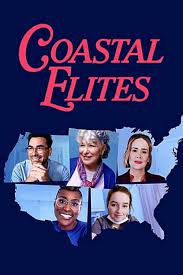
COASTAL ELITES
US, 2020, 88 minutes, Colour.
Bette Midler, Dan Leavy, Issa Rae, Sarah Paulson, Kaitlyn Dever.
Directed by Jay Roach.
This is a HBO production released in 2020. It was filmed during the early months of 2020, the beginnings of the pandemic, the last year of Trump’s administration. It was released first during the final months of the 2020 election campaign which led to Trump’s defeat, his accusations of a rigged election, the insurrection at the Capital on January 6, 2021.
This is a film preaching to the converted – Trump’s supporters will be irritated, offended, angered. Not converted.
The film is very strong in its condemnation of Trump, of his family, of VP Mike Pence, of Trump’s initial response to covid-19.
The film was directed by Jay Roach, who began with broad comedies with Mike Myers, Austin Powers. He then moved into political satire through drama, Recount on the 2000 election in Florida, Game Change on the 2008 financial crisis, Trumbo, All the Way (about LBJ) and Bombshell focusing on Roger Ailes of Fox News and the harassment accusations.
The film is a succession of five monologues, actors talking straight to camera, sometimes in one take. The actors are particularly successful in engaging the audience, articulating their characters, bringing a dramatic force to the monologues. To that extent, they are exemplary.
The film opens with a long monologue by Bette Midler as a Jewish matron from New York City, arrested by the police and addressing them, talking about her Jewish background, the lifestyle of Jewish women in New York City (with a touch of satire), but expressing her distrust and disgust with Donald Trump, moving into more aggressive language, taunting him. She is articulate in the Bette Midler style – showing that Bette Midler in her 70s still has a vigorous presence. Her character then engages with a Trump supporter, young, and her arguing the issues with him. Finally, she is going to the theatre, talks with the manager, raises issues of how Jewish mothers went to theatre to enjoy but also develop ideas. Afterwards, she is arrested.
The transition is to a much shorter monologue spoken by Dan Levy, prominent because of the success of the television series Schitt’s Creek. Levy is a gay man and draws on his own personal experience in this comic monologue about himself as an actor, auditioning for a role in the big budget superhero film with a gay superhero. His character is self-deprecating, talking about his career, small beginnings, his own personal life and relationships. He talks about the auditions, the way he handled the situation, the superhero talking to a young girl. And, contrary to audience expectations, he is continually called back. And there are his reflections on what it is to have a gay superhero in contemporary American cinema. However, at one stage, in the spirit of the film, he condemns VP Mike Pence for his stances, moral and religious, on gays in the military and on gay marriage.
The third monologue is by actress in film and television, African-American, Issa Rae. This monologue is even more explicit in its criticism of Donald Trump and his family. The premiss is that the speaker comes from a wealthy family, went to a private school where one of her classmates was Donald Trump’s daughter, Ivanka. The speaker reminisces, describes Ivanka and her manner (and lack of manner) in strong terms. Then, her father is invited to the White House and she accompanies him, amazed at the layout of the White House, suspicious of Donald Trump and his manner, his roving eye, the satiric shot at Melania and further comments on Ivanka, especially as Ivanka offers the speaker an opportunity to share causes and work with her. Which, emphatically, she refuses.
Sarah Paulson is the star of the fourth monologue, a television personality involved in soothing programs, mindfulness, meditation and reflection, calm words and reassuring, attractive nature backgrounds. However, with the pandemic, she goes to visit her family in Wisconsin to find them rabid, ultra-rabid Trump supporters. She finds she cannot discuss with them and she becomes more and more distressed and angry on screen. Ultimately, she feels she has to leave but is taken aside by her father who, confidentially and surprisingly, is anti—Trump because of Trump’s stands on the candidature of John McCain in 2008, where Trump denounced him as a coward because of his war record and imprisonment – with a shot that Trump himself was a draft avoider.
There is quite some pathos in the final monologue, delivered by Kaitlyn Dever as a nurse in a hospital which is swamped by covid patients, one of them Miriam, Bette Midler’s character from the first story. Here is a weariness, the difficulties of having the equipment, PPE, other nurses becoming infected and quarantined, the number of deaths, the patients on ventilators… She talks with Miriam and admires her, Miriam’s strong spirit, improving day by day even as the nurse becomes weary, overwhelmed by the demands of work. But, ultimately Miriam dies, sadly, and the nurse meets with her daughter to determine what to put on Miriam’s grave in the context of Miriam’s denunciation of Trump, his bombast, saying that everything was going well, urging covert sufferance to take bleach and disinfectant. They finally concur that what her final message is: Fuck you.
Which seems to be one of the main motivations for making this film and its anti-Trump stances.
Fallout, The

THE FALLOUT
US, 2021, 93 minutes, Colour.
Jenna Ortega, Maddie Ziegler, Niles Fitch, Will Ropp, Lumi Pollack, John Ortiz, Julie Bowen, Shailene Woodley.
Directed by Megan Park.
The title refers to the aftermath of a mass shooting in an American school. American audiences have become accustomed to such mass shootings, especially over the last 20 years and more. Audiences from other countries will still be amazed at the availability of firearms for ordinary Americans and the frequency with which there are massacres in schools.
The central character, Vada, played effectively by Jenna Ortega, is 15 years old, of mixed ethnic parents, with a sister, intelligent, good friends with a young gay student. All this changes when there is the mass shooting at the school and she takes refuge in the toilet along with fellow-student, Mia (Maddie Ziegler).
The bulk of the film is about the fallout and its effect, especially on Vada. She cannot go to school, withdraws, tries to make contact with her friend but he has found a different interpretation, wants to do something about such massacres in schools. She visits Mia and they become friends, discussing, supporting each other – which leads to a sexual encounter. Mia also introduces Vada to drugs and there are some scenes where she hallucinates quite vividly.
Ultimately, she goes back to school but is under the influence of drugs, after the encounter with Mia, feels rebuffed by Nick, tries to reach out to the brother of one of the dead students but he is in a different place emotionally. She then tells everything to her mother – which is rather a shock to her but she tries to listen. And her father takes her out to the cliff top where they have some primal screaming and swearing.
Grim suggestions at the end of the film.
- A film for a teenage audience? Family, school, tragedy? Coping and not coping?
- The American town, home, parents, sister, school, students, the streets, atmosphere? The musical score?
- The title? The shooting? The aftermath?
- Introduction to Vada, 15, at home, relationship with her parents, the Hispanic father, the white American mother? Tensions with her sister? At school, asking questions in class, intelligent? The phone call, her sister and her period, the reassurance?
- In the restrooms, Mia and the make up, hearing the shooting, taking refuge, the fears, the wounded student, the blood? Six minutes of terror?
- Vada, coping and not coping, withdrawing? Conversations at home, her sister with a list of those who died? Vada retreating? Her relationship with Nick, chatting, friendly, his being gay? His different response to the shootings, wanting a better world, wanting to do something about it, campaigning? Loud and not able to respond? Her going to visit me, Mia and her parents abroad, the talk, friendship, the wine, stay over, Mia and her dancing? The effect on Vada, the drinking, the sexual encounter? The aftermath for each of them? Mia and the drugs, Vada approaching the dealer, getting high, the hallucinations and behaviour?
- Her parents, trying to communicate? The mother prim? The father eventually taking voted to the cliff, shouting, swearing, release? The bond with her father?
- Nick and his reaction and her being hurt? The meetings with Quentin, his dead brother, going with me to the service, his reticence, her affection? His response jolting her?
- Coming home after being out, the confrontation, talking with her mother, telling her everything? Her mother trying to cope?
- Vada by herself, thinking things through, – and the final abruptness and her emotions?
Death on the Nile/ 2022
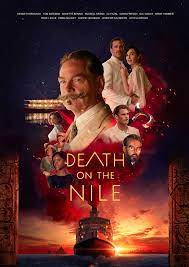
DEATH ON THE NILE
UK/US, 2022, 127 minutes, Colour.
Kenneth Branagh, Tom Bateman, Annette Bening, Russell Brand, Ali Fazal, Dawn French, Gal Gadot, Armie Hammer, Rose Leslie, Emma Mackey, Sophie Okonedo, Jennifer Saunders, Letitia Wright, Susannah Fielding.
Directed by Kenneth Branagh.
Most audiences will enjoy this version of Death on the Nile – purists critical of the film versions of Agatha Christie’s novels will have some difficulties with changes in the plot and with Brenner’s portrayal of Poirot. And, possibly, audiences think that Peter Ustinov’s Death on the Nile should not be remade. (And, there was a version with David Suchet in the television series with all the Poirot novels.)
For audiences who were not taken by Kenneth Branagh’s interpretation of Poirot on the Orient Express, nor of his luxurious moustache, there is a transition here. In fact, there is a very interesting interpretation of his moustache, its size and his wearing it (and a surprising momentary revelation in the final minutes of the film).
The film actually opens in the trenches of World War I, quite an elaborate re-creating of the trenches (echoes of 1917), a planned attack on a bridge, seemingly a death sentence, but a younger Poirot advising an immediate attack, given the clue of the flight of birds and the setting of the wind. The attack is a success but his commander and Poirot are wounded, Poirot in the face – and some poignant moments as his fiancee come to visit him in hospital. Poirot is capable of love.
Shift to 1937, the period for the murder mystery. We visit a London club with a singer, Salome von Otterbourne (Sophie Okenado) in the Josephine Baker style. We also see a devoted couple, Jacqueline and Simon (Emma Mackay and Armie Hammer) eagerly dancing. Then, spotlight, Linnet arrives, and imposing Gal Gadot – and then a switch to the Nile with Linnet and Simon married, and an intensely jealous Jacqueline pursuing them.
Audiences will enjoy very much the photography of Cairo, Pyramids and Sphinx, the Nile, the Valley of the Kings, the interiors of the monuments, the vastness.
But, at the hotel in Cairo, no sign of World War II imminent, the lavish and indulgent lifestyle of the very rich and careless, Poirot is on holidays. In fact, we discover that he has been commissioned to follow up on his good friend, Bouc (Tom Bateman) because his mother (Annette Bening) is not happy with his love for Salome Von Otterbourne’s niece, Rosalie (Letitia Wright). And then Jacqueline reappears, haunting, menacing, and on her tour of the ruins, Linnet is almost killed by a falling boulder.
The solution, everybody to go on a cruise up the Nile. Jacqueline again, the shooting, Simon wounded, the discovery of Linnet shot in her bed – and everyone having an alibi.
Actually, Poirot is much more human, humane in this film than in the others, relating better to people – although, Rosalie has an extraordinary outburst criticising him (in the vein that Agatha Christie was feeling at the end of her career and disliking Poirot!). Many in the audience will know the solution from reading or the previous films so it is not a matter of whodunnit or but, rather, watching how clues are presented and the final explanation.
The cast is strong, not quite as spectacular as the 1978 version, but there is the pleasure of seeing Dawn French and Jennifer Saunders as well as an almost unrecognisable Russell Brand as the doctor.
Except for purists, an enjoyable visit to Agatha Christie land.
- The popularity of Agatha Christie? Of this novel? Film versions of Christie novels? Previous versions of Death on the Nile?
- A Poirot story, audiences imagination of Poirot? On screen, Albert Finney, Peter Ustinov, David Suchet, Kenneth Branagh? Relative merits?
- The recreation of period, World War I, the trenches, hospitals? The 1930s, London, the club? Egypt, the beauty of the Pyramids and Sphinx, the Valley of the Kings, the Nile, the voyage? The musical score?
- This film showing more of Poirot and his character? The effect of the World War I trench sequences, the dilemmas, the dangers, the attention given to the production design of the trenches, no man’s land? The leader, the orders, to take the bridge, Poirot and his suggestion, the wind, the flight of the birds, the success of the mission? His grief at the commander standing on the mind? Poirot and his injuries, his fiancee coming to see him in hospital, the damage to his face? And the decision to have the moustache as cover? The satisfactory explanation of the moustache, and for audience sympathy? And the epilogue and his removing the moustache?
- Poirot, his reputation, his character, self-promotion? 20 years in England? Socialising, going to the club, his response to Salome Von Otterbourne and her singing, the staff, his cakes? His observing Jacqueline and Simon Doyle, Linnet and her arrival, taking centre stage? The engagement, Simon and lifted dancing, Poirot and his sense of doom?
- The transition to Egypt? Fashionable hotel, lavish lifestyle, affluence, snobbery? The introduction to the guests? The revelation that Linnet and Simon were married? The pursuit by Jacqueline? Poirot in this context, on holiday, asked to look out for Jacqueline, the later revelation that his mother had asked Poirot to check on him and his relationship with Rosalie?
- At the Pyramids, Bouc and his kite, borrows initial reaction, his friendship with Bouc, the discussions, his mother, his relationships? Bouc standing in for Colonel Race from the novel and earlier films? Sharing the detection with Poirot? The accusations, stealing the jewellery, witness, his being killed? His mother’s grief?
- The threat Jacqueline, her turning up, Linnet and her reactions, fears? Simon and his hostility towards Jacqueline? The decision to go on the cruise?
- The lavish boat, the crew, waiting on the guests, carrying luggage, Louise as Linne’s maid, having to supervise the luggage? On board, the style on the ship? The tourism, the Valley of the Kings, the monuments, the threat to Linnet with the boulder? Then the arrival of Jacqueline?
- The introduction to the range of characters, Salome, the race issues, life in the US, the 1930s, her career, singing, style? Her personal aplomb? Her niece, strong-minded, the relationship with Bouc? Mrs Van Schuyler, her snobbery, yet communism? Linnet as her goddaughter? Bowers as her companion, and the later acknowledgement of the relationship? Bouc’s mother, her seeming condemnation of Poirot, yet the revelation that she had hired him? The doctor, his past attention is to Linnet, the strange thing of his being part of the entourage? The accountant, the keeping of the books, wanting Linnet to sign contracts?
- The murder, the situation in the lounge, Jacqueline and shooting Simon, his wounds, his being taken, supervised by Bowers? The reason discovery of the dead? The shock to the head? The disappearance of the jewellery? The seeming impossibility of anybody board killing Linnet?
- The investigations, Poirot and the clues, the role of the doctor, with Simon, his personal involvement? Bouc, the revelation about the jewels, his motivations, his witness? His death? Louise, forgetting the make up, her background, suspicions, her death? Bowers, the interrogation, further motivations?
- Jacqueline, her determination, the shooting of Simon?
- The dredging of the river for the gun, the various people with guns? The number of shots? The missing staff? Euphemia finding the jewels in her room?
- The gathering of everyone together, the explanation of the crime, the plan by Simon and Jacqueline, the motivations, the two shots to Simon’s leg, his murdering Linnet?
- Six months later, Poirot, the club, listening to Salome, and his moustache removed?
- The Agatha Christie style, locations and characters, murders, clues, seeming impossibility?
Sammy Davis Jr: I've Gotta Be Me
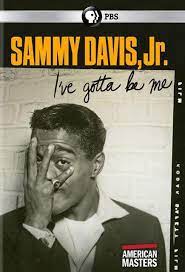
SAMMY DAVIS JR.: I'VE GOTTA BE ME
US, 2017, 100 minutes, Colour.
Directed by Sam Pollard.
This is a fine portrait of Sammy Davis Jr. It is part of the very interesting American Masters television series. Director Sam Pollard has a long history of producing and directing documentaries. Writer, Lawrence Masilon, has also written a number of documentaries including Richard Rogers for American Masters.
This is an interesting film even for those who know very little about Sammy Davis Jr or for whom he is a media personality of the past. Since he started in show business when he was a little boy, there is a vast amount of footage for the filmmakers to choose from, early short films where he danced with Ethel Waters at the age of eight, Rufus Jones for President. There is also footage when he toured the United States with his father and his Godfather, calling him in his uncle, a trio of tap dancers who, especially after the war, was celebrated on the main American television shows. There was great praise for Sammy himself, especially from Eddie Cantor who promoted him and became something of a father figure to him. Jerry Lewis and Billy Crustal offer very personal memories.
One of the things that Sammy Davis Jr regretted was that he had no schooling, no education, finding it difficult to write, even to spell. That did not prevent him from being articulate and writing some of his own material. There is sadness in listening to his reminiscences about his being called up, the personal and racial attacks, violent, on him in the armed services.
While the film shows the extraordinary range of his talent, there are some highs and lows in his political connections, JF Kennedy’s friendship with the Rat Pack and his not inviting Davis to his inauguration celebrations. This is in contrast with a decade later and Sammy Davis Jr’s endorsement and literal embrace of Richard Nixon. Criticisms were made during Davis’s time, especially the connection with the Rat Pack, that he really wanted to be white. There is also the mixed reaction to his entertaining the troops in Vietnam – and his declarations of not approving the war but of supporting the young men who went to fight there.
There are various sequences of his friendship with Frank Sinatra and Dean Martin, singing with them, clowning with them, making films with them, although Joey Bishop and Peter Lawford appear in some of the dance routines and on the posters, they do not get much attention or mention.
There are the issues of his marriage, a small show marriage to a black woman, his falling in love with Mai Brett, their marriage, reported at the time, hostilities towards interracial marriage. But, as with so many show business personalities, with his preoccupation with performance and travel, the marriage fell apart. There were also his problems with drugs and alcohol, especially in his finally being hospitalised and his death from cancer at 64.
However, most of the film is a celebration, with successive headings to illustrate his talent as a dancer, an extraordinary tap dancer, even dancing with Gregory Hines at the final celebration of his 60th birthday. Then there is his singing, a strong voice, able to take on any kind of song – and his joy at playing This Sporting Life in Porgy and Bess and singing It Ain’t Necessarily So.
He was also a television personality, eager to go on as many shows as possible, Lucille Ball, Patty Duke… Sometimes acting as himself, sometimes doing the song and dance routine.
He was also in many films though this documentary underplays his series with the Rat Pack, just showing him in the posters. However, singing in film combined with his singing the Candyman for Willy Wonka – and it becoming, from the 70s, one of his signature songs, the film showing a variety of his performances of the song.
He also found a talent for mimicking and impersonations – and a number of these are incorporated, especially with Humphrey Bogart who took time out to discuss how to impersonate him better. There are some criticism of him impersonating a range of white actors like James Stewart.
There is also his concern and social outreach, and his patriotism.
For those who admire Sammy Davis Jr, they will find this a wonderful tribute. For those who did not know him well, this is a fine introduction to him and the range of his talents.
Chef Antonio: Recipes for Revolution
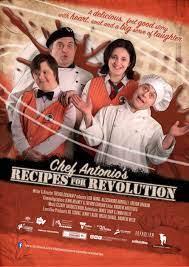
CHEF ANTONIO's RECIPES FOR REVOLUTION
Italy/Australia, 2021, 99 minutes, Colour.
Directed by Trevor Graham.
Looking for a positive story, frequently heart-warming, then why not go to visit the Alpine Italian town of Asti? There you will find a big jovial chef, Antonio de Benedetto, often smiling at camera, a cheerful presence in his kitchen. And, there are quite a few cooking sequences, of course, and actually, for those with a love for tastes Italian, the tagliatelle and the special pizzas look pretty good.
But, there is much more. Chef Antonio’s recipe is for food to change life, even to change the world.
And his recipe? An idea that he realised in a kitchen, working with his brother, that he should train and employee young people. Nothing startling in that. Except that these young people all had Down Syndrome. Over a period of time, he trained them at a restaurant in Asti, finding enough money, eventually, to buy a hotel in the city and use it as accommodation for the trainees as well as an opportunity for skills in hotel management, changing and cleaning rooms…
So, we are introduced to several of these young people, especially Nicola who was there at the beginning, with Mirko and some detailed sessions of how to train for kitchen work, from learning how to sharpen knives, slice tomatoes and vegetables, mix ingredients, prepare cakes and delicacies. And, then smartly dressed in waiters’ attire, discipline with hands behind their back, knowing how to serve tables and make the right remarks, pour the wine, be attentive.
The screenplay describes this as “social inclusion”.
While the film shows the story of Antonio and his family, as well as Fiorella who shares in the training of the young people, we get the background, with photos, of Nicola, Mirko, and their girlfriends Jessica and Francesca and Irene. There is the pathos of the mothers discovering the children are living with Down Syndrome, some escaping from the responsibility, others taking on the responsibility (with one mother forever dominating, cheerfully, her son and his girlfriend).
Antonio’s aim, after opening the Albergo Etica in Asti, was to have similar hotels around Italy, travelling to Rome to receive an award and acclaim, to open a hotel in Rome – with the trainees/employees enjoying the sights of Rome (as we do with moving postcard glimpses of all the popular sites).
Information is given that similar hotels have been opened in Argentina and Slovakia.
And the Australian connection? The writer-director, also involved in cinematography and editing, is veteran Trevor Graham, whose documentaries go back to 1980s with politics, Red Matildas, to the 90s with a documentary about Eddie Mabo, and more recently the rather exotic kitchen documentary, Monsieur Mayonnaise. This film has investment from Screen Australia as well as from Film Victoria and the Victorian government.
And, at the end, the good news that recently a similar hotel was opened in the Blue Mountains. Here’s hoping.
Best wishes to Qui in Fiji.
Best wishes to Qui in Fiji
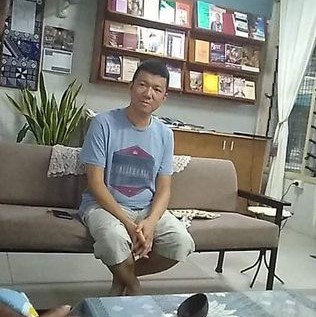
Qui, one of the first of our Vietnamese confreres professed and ordained. After ordination, he went to Rome to study Scripture at the Angelicum University. He returned to Australia and an appointment to the Pacific Regional Seminary, PRS, in Suva.
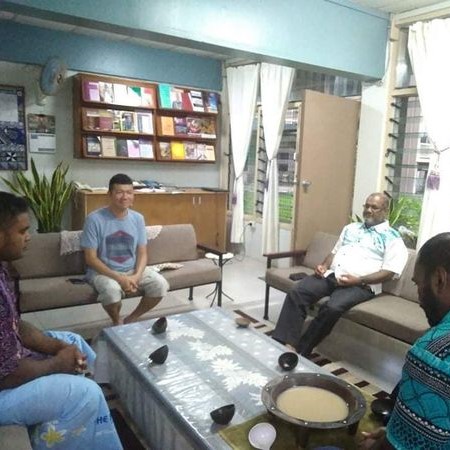
BUT… covid 19. Based at Our Lady of the Rosary Parish, Kensington, Qui was able last year to do some online sessions but, happily, Qui is now in Suva at PRS.
MSC stories, the Pacific, Japan, Wurrumiyanga.
MSC stories, the Pacific, Japan, Wurrumiyanga
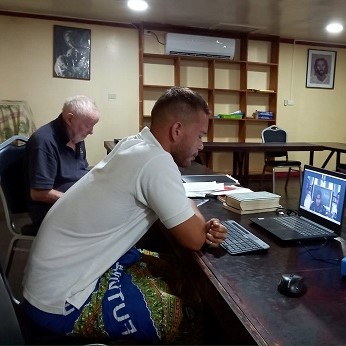
Col Sinclair, Suva and Kiribati
PRS Academic Year begins today. The Pre-Novitiate programme has also begun.
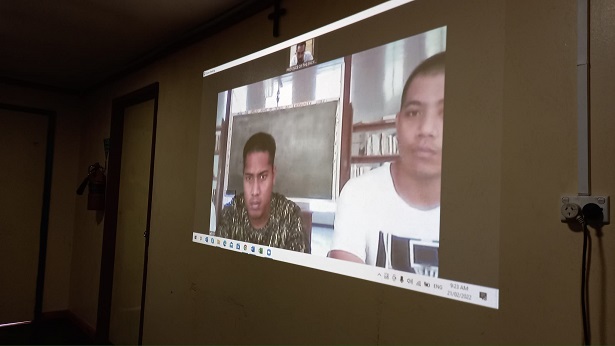
Br Colin (Director of the Pre-Novitiate) gives first day class with two participants from Fiji and three participants from Kiribati who are attending the class on Zoom.
Ben Tethool, Regional Superior, Japan
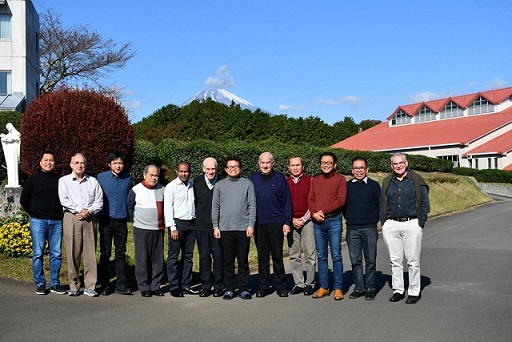
MSC Japan
Peter Hendriks writes: Regional Superior Japan: Bernard Tethool has been appointed the new Regional Superior of Japan and his appointment will take effect on 1st April 2022 and is for an initial period of three years. Priyo Susanto has been Superior for just over nine years. The decision was made by the Provincial in Council following a consultation with the community in Japan. Bernard celebrated 30 years as a priest early this year. He is originally from Indonesia but a few months after he was ordained, he began his ministry in Japan, where he has been ever since. Currently he is Parish Priest of Johokubashi Catholic Church.
Farewell to Pat Mara, Wurrumiyanga
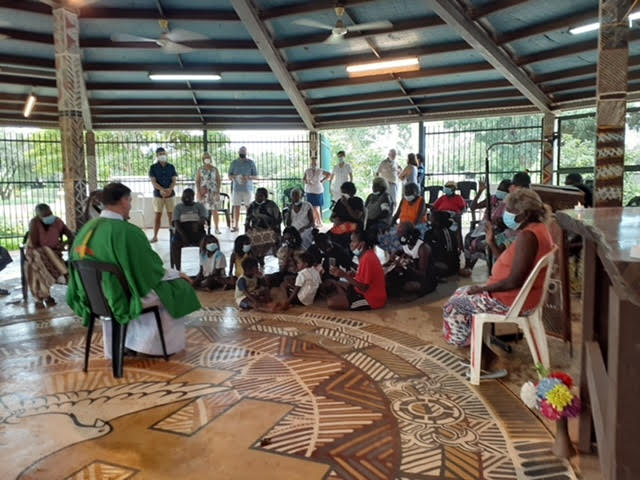
Goodbye to Pat Mara who, after 6 years on Bathurst Island and a year studying in Sydney has been appointed to Randwick parish.
Vince Carroll, from Downlands, will spend some time there during this year.
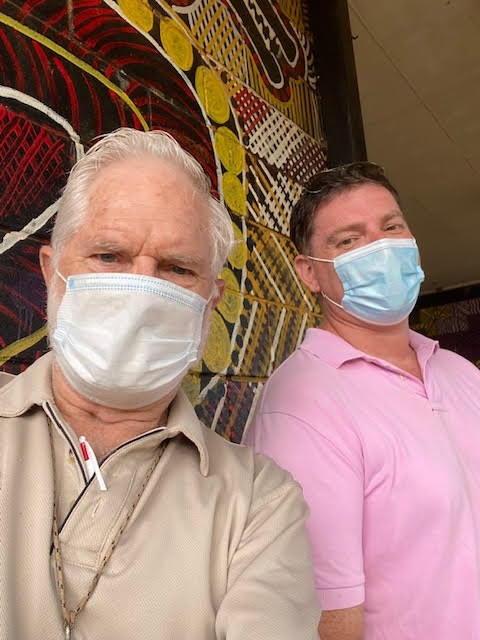
Directors of Ministries and Provincial Council Meetings at St Mary's Tower
Directors of Ministries and Provincial Council Meetings at St Mary's Tower
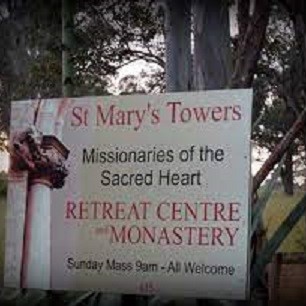
There was a gathering recently of the Directors of Ministries and the Provincial Council.
The first day was a facilitated by Anne McAtomney, the Chevalier Institute Director, whereby she led a day of formation for the Directors and the Councillors. It was an opportunity for those new to Heart Spirituality and the MSC Charism to be introduced to it - and for those more familiar, to go deeper.
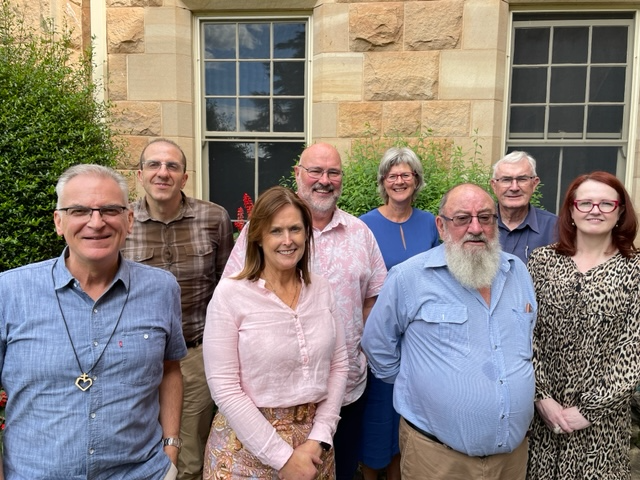
o © Chris McPhee msc - Provincial
o © Andrew Mir - Province Bursar, Business Operations
o © Catherine Molihan - Province Care and Assisted Living
o © Mark McGinnity - MSC Education
o © Clare Shearman - Heart of Life, MSC Spirituality and Pastoral Formation
o © Roger Purcell msc – Mission Office
o © Frank Dineen msc – Formation, Vocations and On-going Formation
o © Meta Jackman – Professional Standards and Safeguarding.
The second day was set aside for the Directors to talk to the Council and the other Directors about their ministry. It was a very rich time of listening to each other and learning how our charism is expressed in so many different ways.
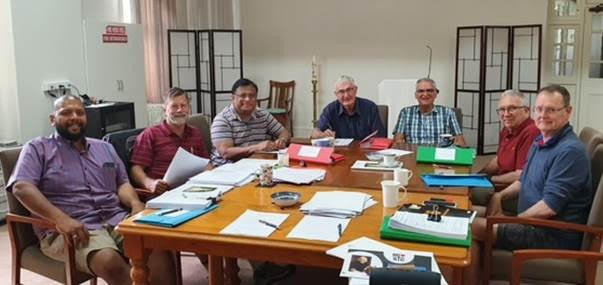
Provincial Council.
Chapter of the Australian Province 2023: Chris McPhee has sent a letter to all professed MSC informing them of the dates for the 2023 Chapter. It will be held 17th-28th April. It is earlier than in previous years because the General would like to know by May who will be the delegates for the General Chapter. The General Chapter is in the latter half of 2023.
Welcome to Long/ Long Tran.
Welcome to Long/ Long Tran
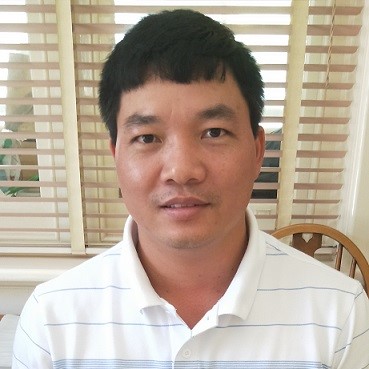
Long arrived in Australia last month and we featured his welcome by Frank Dineen and Trieu at Mascot (and then his rapid doomestication washing up at Douglas Park).
Long comes from a town 100 kms from Hanoi. He is 34 this year and has two brothers at home. He has worked in restaurant management, the business and supervising side. He also has studied three years of seminary studies in philosophy.
But Long has been part of our Blackburn community already – in 2021 by Zoom. He was in contact with Khoi and studied in the English as a second language course at YTU. Now at Cuskelly House, he will continue English studies by Zoom and covid-permitting, face to face.
Welcome.
